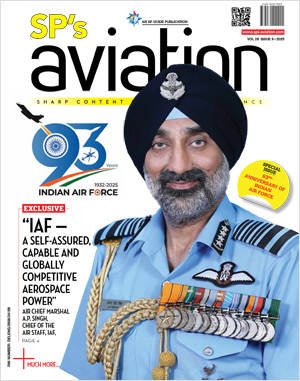INDIAN ARMED FORCES CHIEFS ON OUR RELENTLESS AND FOCUSED PUBLISHING EFFORTS

The insightful articles, inspiring narrations and analytical perspectives presented by the Editorial Team, establish an alluring connect with the reader. My compliments and best wishes to SP Guide Publications.

"Over the past 60 years, the growth of SP Guide Publications has mirrored the rising stature of Indian Navy. Its well-researched and informative magazines on Defence and Aerospace sector have served to shape an educated opinion of our military personnel, policy makers and the public alike. I wish SP's Publication team continued success, fair winds and following seas in all future endeavour!"

Since, its inception in 1964, SP Guide Publications has consistently demonstrated commitment to high-quality journalism in the aerospace and defence sectors, earning a well-deserved reputation as Asia's largest media house in this domain. I wish SP Guide Publications continued success in its pursuit of excellence.
- A leap in Indian aviation: Prime Minister Modi inaugurates Safran's Global MRO Hub in Hyderabad, Calls It a Milestone
- All about HAMMER Smart Precision Guided Weapon in India — “BEL-Safran Collaboration”
- India, Germany deepen defence ties as High Defence Committee charts ambitious plan
- True strategic autonomy will come only when our code is as indigenous as our hardware: Rajnath Singh
- EXCLUSIVE: Manish Kumar Jha speaks with Air Marshal Ashutosh Dixit, Chief of Integrated Defence Staff (CISC) at Headquarters, Integrated Defence Staff (IDS)
- Experts Speak: G20 Summit: A Sign of Global Fracture
The Sinking Feeling

At this point, Kingfisher has defaulted on most of its financial obligations, and is operating essentially on a ‘cash-and-carry’ system for critical charges such as landing fees and fuel. To top it all, its bank accounts, which receive the carrier’s revenue inflows, have been seized.
Photo graphs of the media savvy business tycoon Dr Vijay Mallya continue to appear with the accustomed regularity in the leading national dailies; but these days, with a difference. The usual nonchalant attitude and the confident smile of a successful businessman have been replaced by bewilderment and a stern scowl. Clearly, the dire financial position of Dr Mallya’s pet airline Kingfisher is taking a toll on its once proud owner. Amidst an already severe financial crisis the airline is passing though domestically, more damning evidence is emerging; this time from offshore financial establishments as well. A new report from the UK High Court claims that the embattled airline owes $21.6 million ( Rs. 108 crore) to the Bank of Scotland for overdue lease payments on 10 ATR 72-500 aircraft.
The above-mentioned represent only the latest credit issue for the Kingfisher, which has been continually grappling with lessors since the airline first entered into a state of financial crisis in November last year. Since then, Kingfisher was forced to shrink its operations at a rapid pace, down to 175 flights per day (versus 340 at the same time last year). But instead of providing certain amount of financial relief, this step has actually put the airline in a Catch-22 like situation. Because the decline in revenues has further eroded Kingfisher’s cash flow, making it difficult for the carrier to pay for the contracts entered into when its operations were more than twice the current size. Adding to the mounting woes is the fact that Kingfisher is more than Rs. 7,000 crore ($1.4 billion) in debt with interest payments now at an astronomical 25 per cent of revenues. At this point, Kingfisher has defaulted on most of its financial obligations, and is operating essentially on a ‘cash-and-carry’ system for critical charges such as landing fees and fuel. To top it all, its bank accounts, which receive the carrier’s revenue inflows, have been seized by the Income Tax Department for non-payment of outstanding tax dues, including TDS on the employee’s salaries.
To compound its problems, India’s aviation regulatory authority DGCA too has continued to repeat its concerns over potential safety violations in the face of Kingfisher’s financial difficulties. The regulator has already deregistered three Kingfisher A320s owing to maintenance/safety issues and the situation if anything is likely to worsen further in view of the maintenance crews’ recent strike. According to reliable sources, out of the 64 aircraft on the carrier’s strength, only about 22 were operational by February end. This led to large scale cancellations of flights with the airline shutting down most international short-haul operations. The dismal scenario that Kingfisher finds itself in has resulted in a cascading effect with the airline’s market share dropping to 11.3 per cent accompanied by more than a 13.5 per cent drop in the stocks of the company.





